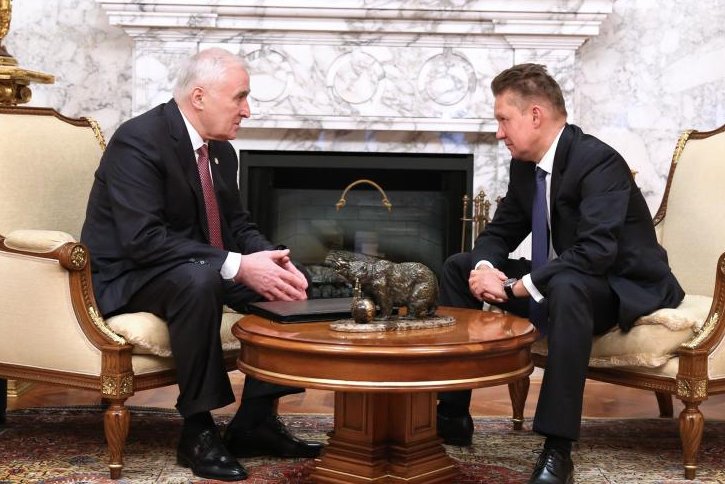Alexei Miller (R), director of Russian gas company Gazprom, meets with leader from the breakaway Georgian republic of South Ossetia to review pipeline and resource networks in the region. Photo courtesy of Gazprom.
MOSCOW, April 1 (UPI) -- Russian energy company Gazprom said it was working to meet the full gas demands for South Ossetia, a republic near the center of rows over European power.
Gazprom Chairman Alexei Miller met in Moscow with South Ossetian President Leonid Tibilov to review gas supplies to the former republic of Georgia.
"The parties discussed the development prospects of South Ossetia's gas transmission infrastructure within the framework of the general gasification scheme of the republic drafted by Gazprom," the Russian gas company said in a statement. "By implementing the scheme, the company would meet the full demand of local consumers for pipeline gas."
The development scheme calls for the construction of more than 500 miles of gas pipelines across the republic. Gazprom in 2009 commissioned a line designed to provide a direct link between South Ossetia and Russian natural gas supplies.
South Ossetia is central to the European effort to break the Russian grip on the regional energy sector. Georgia launched a military attack on the self-proclaimed republic of South Ossetia in August 2008, sending ripples through the regional energy sector due to the proximity of the Baku-Tbilisi-Ceyhan oil pipeline, the second longest in the world.
Two years after the conflict, Gazprom and South Ossetia signed bilateral gas agreements that extend until 2029.
In 2014, Georgia opened a transport terminal for a pipeline tied to infrastructure associated with the Shah Deniz gas field off the coast of Azerbaijan. Europe views Shah Deniz as a means to diversify a natural gas market dependent on Russia. For Georgia, a former Soviet republic, it's part of a broader shift away from the Kremlin.















